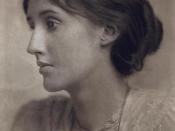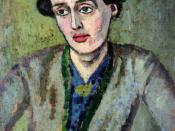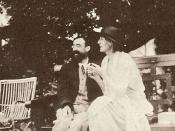Thelwell v. Woolf Modernist art of the 20th century had a great impact on the way we perceive the things around us. With its blurred lines and vague intimations about the world, it forced its audience to expand their minds and reflect on oneself before understanding the creation. There usually is not a total consensus on modernist art. Whether it is poetry, fiction, painting, or drawing, the audience will, without fail, have differing opinions of what the artist's motivation as well as the meaning of the piece. This is the exact point that Thelwell discusses in his piece, "Modernist Fallacies and the Responsibility of the Black Writer": ""æthe emergence and rise of modernism in Europe represented rather abrupt turning away from what had been the first responsi- -bility of the novelist- that of communicating generally shared and accessible truth and perceptions, which implicitly must mean socially and culturally derived insights and knowledge."
(Thelwell, 223) Thelwell is obviously hinting that modernist art of the 20th century has had a negative effect on the way that people perceive and understand art as a whole. What is lost, in fact, is the art of communication and getting across a message to the audience. He goes on to discuss the loss of the middle and lower classes in the participation of art blaming it on the "private aestheticism" of modernist work. At first sight, Virginia Woolf's To the Lighthouse seems to suffer from this shortsightedness that Thelwell mentions. The style with which Woolf depicts life for this average English family of the early 20th century is with such a distinct meandering that one could easily concede this work as falling into the pitfalls of what Thelwell condemns. In fact, Woolf does make attempts at social commentary and makes some poignant arguments that do...


